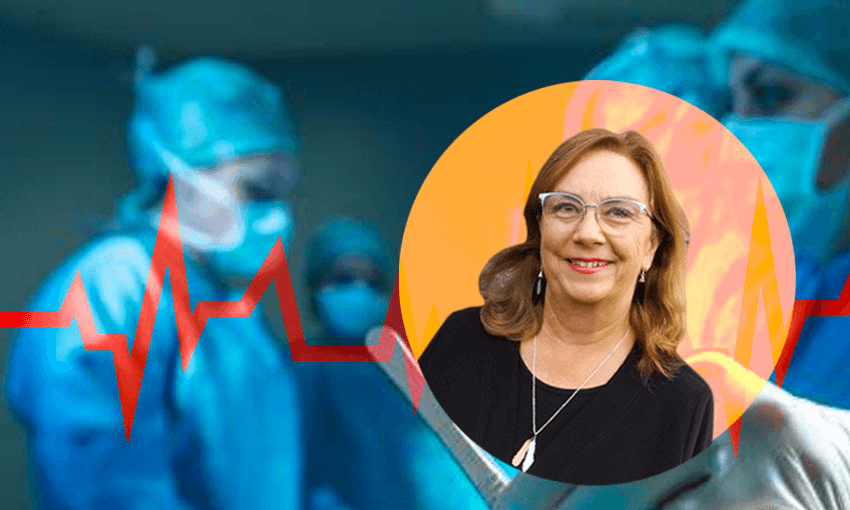In the middle of a pandemic, Dr Vanessa Beavis has just taken charge of one of Australasia’s largest medical colleges. She talks to The Spinoff about life as an anaesthetist over the past few months.
In between scheduling surgeries just a week before we moved to level two, Dr Vanessa Beavis recorded a speech accepting her new role as president of the Australian and New Zealand College of Anaesthetists (ANZCA). She should have been in Perth, celebrating with thousands of her Australasian colleagues, but the trans-Tasman bubble isn’t yet a reality.
Instead, she pre-recorded a speech for the virtual AGM. “It worked quite well,” she said of the process. Pre-recording meant she could edit out the bungles. “If you’re doing it live then you can’t recover from that.”
If she’d done it live, she likely wouldn’t have bungled anything; Beavis has had many jobs, all of which require getting it right the first time. She’s a founding mind behind New Zealand’s liver transplant programme, an honorary senior lecturer at the University of Auckland, and, until recently, she was a clinical director at Auckland City Hospital and the director of perioperative services at its DHB.
Perioperative medicine is the before, during, and after of surgery. It’s more holistic and requires a good amount of time and care from a doctor. It remains Beavis’ passion, but she can’t do it at the same time as presiding over ANZCA. “It’s always a wrench to leave something you thoroughly enjoy, and – dare I say – was moderately successful at,” she said.
“But that was such a big job, and this is such a big job. You couldn’t possibly do both. Anyway, it’s probably time for a change of the guard.”
Change is something she’s used to, but these days she’s getting more than she’d like. She’s been leading surgical teams at the hospital through the Covid-19 crisis.
“It’s been described as building the plane while we’re flying it,” she said. Her plane’s looking rough but airworthy. “The bare bones of it are there, and now we’re putting paint on the walls and deciding what seat cushions to have,” she said.
In her view, we’ve dodged a bullet. She trained in South Africa and worked in the US before coming to New Zealand, and tales from her colleagues overseas had her horrified at what could happen. “I thought we were preparing for the apocalypse; the rate of people who were rapidly, critically ill, all at once…” she tailed off, leaving the potentialities unspoken.
“Yes, we’re prepared for a disaster – a plane crash or something, we have those kind of plans – but no plans for something that’s sustained like this.”
On top of training for all the new PPE protocols, Beavis and her teams have had to prepare and do walkthroughs of various scenarios: what would they do if a car crash came in? What would they do if a serious infection presented? With the threat of Covid-19 looming in the background, every procedure had to be looked at in a new light; but even that wasn’t straightforward.
“We’d be getting guidelines, all from credible organisations, and all competing and different,” she said. “It was so rapidly changing that you’d make a decision in the morning and say, ‘OK, we’re going to go with this’, and by the afternoon there’d be some new information that came along that required all these changes.”
As an anesthetist, she’s worried about one particular challenge: a drug shortage. Supply chains worldwide have been disrupted due to lockdowns, quarantines, and even bidding wars for what remains on the market.
“Propofol shortage is a major problem for us,” said Beavis. It’s a drug used for sedation. It induces sleep and creates short-term amnesia, for which any patient to wake up mid-surgery would be grateful. “Before propofol, we had thiopentone, which was introduced in the second world war around Pearl Harbour time. So there’s a number of my younger colleagues who haven’t used it.”
Fentanyl, an opiate 100 times the strength of morphine, is also in short supply. “We could use morphine,” said Beavis. “We’re going back to more old-fashioned drugs.”
She said Pharmac is working hard to source more of both before stores are depleted. “We’re ramping up elective surgeries again, so it will run out sooner.” These days, it’s common to use propofol throughout the surgery instead of switching over to another drug that’s inhaled. Going forward, this practice might need to change.
“That’s where it becomes an art. We use a little more of this, a bit less of that,” she said. The number eight wire mentality is a tradition in New Zealand, but during a pandemic, it strikes a darker chord.
As clinical director, Beavis has been responsible for managing patients both with and without Covid-19 who require surgery. Some surgeries can’t be delayed, like emergency appendectomies, scheduled cancer tumour removals, or screwing together severely broken bones. The surgeries are separated into streams: those who don’t have Covid-19, and those who might.
Patients known to have Covid-19 have received surgery – having the virus doesn’t stop you from having an accident. For anaesthetists like Beavis, every surgery requires inserting a breathing tube which is a high-risk procedure as Covid-19 lives in the back of the throat. The intubation procedure gets them up close and personal with the virus.
Beavis has worked through enough healthcare system challenges for two lifetimes, but she’s not finished. Her new role involves leading 6,400 anaesthetists and 1,500 trainees through one of the biggest challenges yet. She has more to worry about than most people, but that could also be why she handles it so well. “I’m worried, but having worked in Africa I know about TB and haemorrhagic fevers,” she said. “When I was a house surgeon, that’s when HIV arrived. I’m worried, but it doesn’t paralyse me with fear. I’m more worried about bringing it home.”
